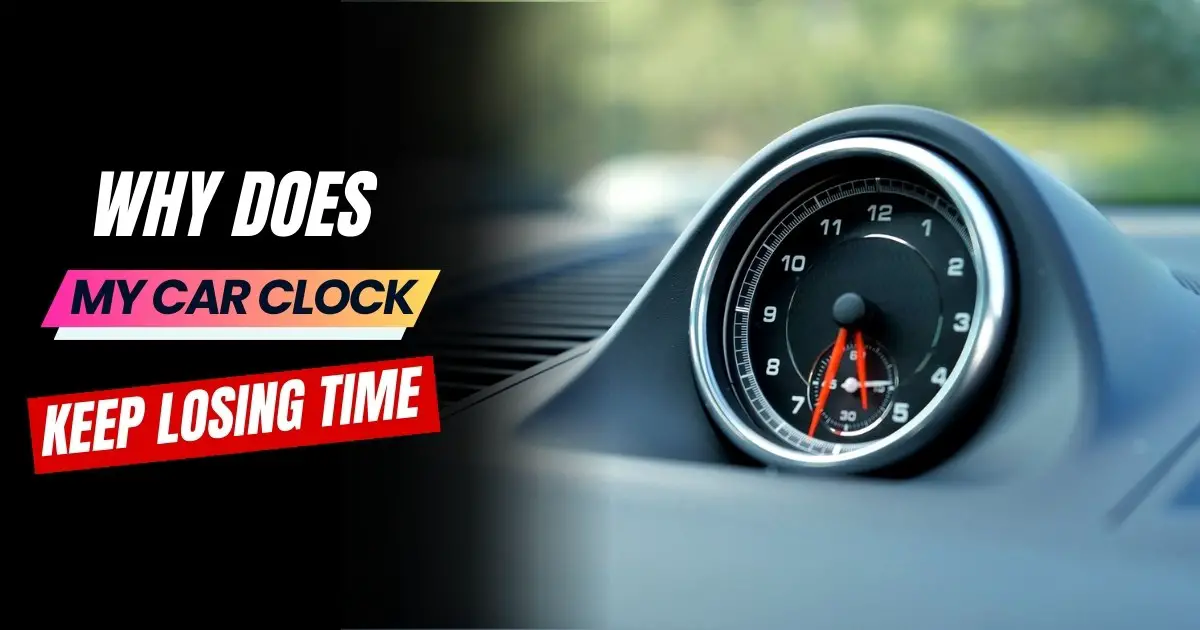Why Does My Car Clock Keep Losing Time? Here is the Truth
For many people, a car clock serves as a convenient feature for keeping track of time during commutes or long drives. It is useful for providing time reference, especially for individuals who don’t wear a wristwatch or rely solely on their smartphones for timekeeping.
That said, motorists frequently encounter the frustration of their car clock losing time every now and then. This is often a minor inconvenience, but it can still disrupt schedules and lead to missed appointments or deadlines.
Why Does My Car Clock Keep Losing Time
A reliable car clock acts as a dependable timekeeping tool, especially during busy schedules and time-sensitive commitments. However, if the car clock loses time consistently, you may face difficulties in coordinating your schedule, especially if you depend on the clock to manage your daily commute.

Common Causes of Clock in Car Not Keeping Time
Battery Issues
The car’s battery serves as the primary power source for the clock and other electrical components. The battery provides consistent voltage to keep the clock running accurately. However, if the battery becomes weak or starts to fail, it can result in an irregular power supply to the clock, causing it to lose time gradually.
Tips for diagnosing car clock losing time battery-related issues include checking for signs of corrosion on battery terminals, testing the battery voltage, and ensuring secure connections. If the battery is found to be weak or failing, replacing it with a new one is often the most effective solution to restore reliable power supply to the clock and other electrical components.
Electrical System Problems
A car clock depends on a complex network of wires, fuses, and components to run effectively. If there are faults within the electrical system, it can disrupt the clock’s functioning and lead to time loss. For instance, faulty wiring can result in intermittent power loss to the clock, causing it to stop or lose time unpredictably.
Similarly, blown fuses can interrupt the flow of electricity to the clock and other electrical components. Other symptoms of electrical system problems may manifest as flickering lights, intermittent power loss, and electrical faults in other vehicle components.
Diagnosing electrical system problems often involves inspecting wiring for damage, testing fuses for continuity, and checking for loose connections. Professional assistance may be necessary for diagnosing and repairing complex electrical system issues.
Inaccurate Clock Settings
Ensuring accurate timekeeping in a car clock isn’t just about its internal mechanisms. Ideally, incorrect clock settings and calibration can lead to time loss or inaccuracies in the car clock. Setting the correct time zone is the first step in ensuring accurate timekeeping. If the time zone is incorrectly set, the clock will display the wrong time, leading to confusion and time loss.
Over time, the clock may drift slightly from perfect timekeeping due to factors like temperature changes or mechanical wear. Now, calibrating the clock helps fine-tune its internal mechanisms to compensate for any discrepancies and ensure precise timekeeping.
External Factors
The performance of a car clock can also be influenced by external factors, including extreme temperatures, humidity, and other environmental conditions. These factors can impact the internal components of the clock, leading to time drift over time.
Temperature fluctuations, in particular, can have a significant impact on the accuracy of the car clock. Exposure to extreme heat or cold can cause expansion or contraction of the clock’s internal components, affecting its overall precision.
As a result, the clock may run faster or slower than intended, leading to time discrepancies. Suggestions for minimizing the impact of environmental factors may include parking in shaded areas, using sunshades, and maintaining proper vehicle ventilation.
Clock Mechanical Issues
Mechanical issues within the clock mechanism itself can contribute to time inaccuracies. Warning signs of mechanical problems may include ticking sounds and inconsistent movement of clock hands. In severe cases, the clock may experience a complete failure to keep time altogether.
Addressing mechanical issues within the clock mechanism often requires the expertise of a qualified professional. Regular maintenance and inspection of the clock mechanism can also help prevent mechanical problems and prolong the lifespan of the car clock.
Software Glitches
Modern car clocks have transitioned to relying on software for accurate timekeeping. However, like any software-driven system, they are vulnerable to glitches, bugs, or malfunctions that can disrupt their functionality and accuracy.
Software glitches in car clocks can result in sudden resets or incorrect time displays. These glitches may occur due to several reasons, including corrupted software data as well as conflicts with other onboard systems.
Additionally, programming errors or bugs within the clock’s software code can contribute to inaccuracies or unexpected behavior. Addressing software glitches typically involves updating the clock’s software to the latest version, resetting the clock settings, or reinstalling the software entirely.
Tips for Keeping Car Clock From Losing Time
- The most common reason for a car clock to lose time is a weak or dying battery. If your car battery is old or weak, it may not provide enough power to keep the clock running accurately. If that’s the case, consider having your car battery tested and replace it if necessary.
- Set your car clock accurately to match the current time. Use a reliable time source, such as your smartphone or a radio station, to synchronize it.
- Adjust your car clock for daylight saving time changes. Many modern cars have an automatic setting for daylight saving time, but if yours doesn’t, remember to update it manually twice a year.
- Make it a habit to check your car clock regularly, especially after long trips or when you notice discrepancies in time. It is not uncommon for car clocks to drift over time due to temperature changes and battery drain.
- Some newer cars have clocks that sync with GPS satellites to ensure accuracy wherever you are. If your vehicle has this feature, ensure your GPS system is up to date and functioning properly.
- If you disconnect your car battery for any reason, your clock may reset to a default time. Remember to reset it promptly after reconnecting the battery.
- Consider using an external clock or navigation system for timekeeping if you find your car clock is consistently inaccurate or unreliable.
Conclusion
An accurate car clock is essential for maintaining efficient scheduling and effective time management. If the clock is inaccurate or keeps losing time now and then, it can lead to delays and general inconvenience. To ensure your car clock remains accurate, it’s important to adjust it regularly, and avoid triggers that can affect its performance. If you’ve tried all the troubleshooting steps and your car clock still loses time, it may be time to consider replacing it with a new clock.






